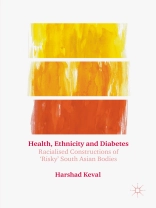This book explores the often contentious relationship between health, concepts of race and ethnicity, and the impact on South Asian groups. Using medical sociological and anthropological perspectives, it excavates racialised constructions of diabetes ‘risk’ within discourses, and highlights the contrasting counter narratives in people’s accounts of their everyday lives.
By identifying a number of components to the discursive, racialised construction of ‘risky’ South Asian bodies, this book problematises taken for granted understandings of culture, lifestyle and genetic risk. The mobilisation of these mechanisms in health science and interventions result in a racialising gaze, directed at groups already experiencing historically embedded race-related issues. The book situates these constructions of risk against the emergent, fluid and dynamic counter narratives to risk constructions. The new found momentum in genetic science is also critiqued in its formulation of racial-genetic risk, especially in the case of diabetes in South Asian groups, and is identified as perpetuating a series of racializing processes.
Daftar Isi
Introduction.- Part I. Contextualising the ‘Risky’ South Asian Diabetic Body.- Chapter 1. Conceptualising Race, Ethnicity and Health.- Chapter 2. Situating the South Asian Diabetic Risk.- Chapter 3.- Constructing the Risk – Faulty Lifestyles, Faulty Genes.- Chapter 4. Method. Part II. Resisting Constructions of Risk – The Counter Narratives.- Chapter 5. ‘Doing Everyday Diabetes.- Chapter 6. Using Complimentary Health and Remedies.- Chapter 7. Diabetes, Biography and Community.- Chapter 8. ‘Race-ing’ Back to the Bio-Genetic Future?.- Chapter 9. Conclusion.
Tentang Penulis
Harshad Keval is Senior Lecturer in Sociology at Canterbury Christ Church University, Kent, UK. He has held posts in Switzerland and the UK and has worked on the intersection of race, ethnicity, culture and health in a variety of countries and contexts, including mental health in South Asia, childhood illnesses in Tanzania and Leprosy in Sri Lanka. His work recently has focused on the racialised constructions of risk in South Asian populations in the UK. He has published previously on the discursive constructions of racialised risk in contemporary health arenas, ‘normalised’ race based rhetoric in contemporary political contexts, and the emergent concerns around post-race discourse and immigration.












